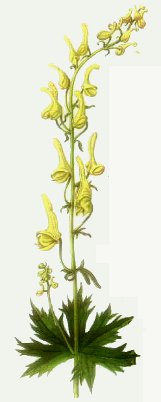 Aconitum
vulparia (lycoctonum) Aconitum
vulparia (lycoctonum) Wolfsbane This is not monkshood but the real deal, wolfsbane, which is a different species from monkshood. This Saturn herb is a classic of garden witchcraft and sacred to Hekate. Wolfsbane is sometimes associated with Mars because of the helmet-like shape of its flowers, although Cornelius Agrippa said that the Mars association came from the fact that it poisons by reason of too much heat (which is a Mars characteristic). Wolfsbane apparently can be used to reverse shapeshifting spells and has a folk tradition of protecting homes against werewolves. There was also the belief that witches dipped flints in the juice of wolfsbane (a very dangerous endeavor in itself) and then threw them at an enemy; such flints were called elf-bolts. One scratch was enough to kill, and that is not folklore. One of the baneful herbs, wolfsbane grows naturally in damp woods in the Alps, where it is a threatened species, and produces sulfur-yellow flowers between June and August. The higher the elevation, the more flowers this plant will get and the longer they will last. It got the name "Wolfsbane" because ancient Germans used it to poison wolves. Bumblebees like this plant because the flower's shape and color says "come on in!" to them. This aconite does not contain aconitine, like monkshood, but does have lycoctonine, which is just as poisonous. Do not get this plant on your skin; it can cause severe itching and dermatitis, and the sap can be absorbed in a cut. Always wear gloves when handling it. Ingesting even a tiny amount of this plant can be fatal, but it's great for keeping werewolves out of your yard and is a classic of the witch's garden. Also known as badgersbane. Cannot be sent to Australia. Top |
Aconitum vulparia Honoring Hekate © 2004-2024 Alchemy Works; No reproduction of any part without permission. |
How to grow wolfsbane |
|
Alchemy Works products are offered for use in spiritual, ritual, meditative, and magical practices, not for medicinal or cosmetic purposes. The information on this website is provided for its folkloric, historic, and magical value. It is not intended to be a substitute for professional medical advice, diagnosis, or treatment.